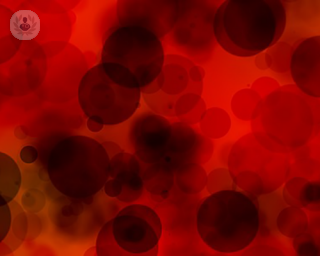Low blood count
What does it mean when someone has a low blood count?
When an individual is told that they have a low blood count, which is often referred to as cytopenia in medical terms, what it simply means is that they have fewer red blood cells, fewer white blood cells, or fewer platelets in the body than what is typically considered to be normal. In other words, the patient's bone marrow is not making enough of one type of a person's blood cells.

What are the associated symptoms?
If you have a low amount of red cells in your body, you might experience the following:
- tiredness
- shortness of breath
- a fast heartbeat
- weakness
In addition, other people might observe that you look slightly pale.
Symptoms of a low white blood cell count can most typically include:
What causes a low blood count?
In the case of a low red blood cell count, possible causes include:
- vitamin B6, B12 or folate deficiency
- kidney disease
- malnutrition
- internal bleeding
- aplastic anaemia
- hypothyroidism
- iron deficiency anaemia
- frequent blood donation
- heavy menstrual bleeding
- cancers such as Hodgkin’s lymphoma, non-Hodgkin’s lymphoma, leukaemia or multiple myeloma
In the case of a white blood cell count, possible causes include:
- medications such as anti-psychotic drugs, antibiotics, or medication for overactive thyroid
- infections such as HIV or hepatitis
- cancers such as leukaemia
- cancer treatment such as radiotherapy or chemotherapy
- autoimmune disorders such as rheumatoid arthritis and lupus
- vitamin B12 or folic acid deficiency
If I have a low blood count, how will this be diagnosed?
A low blood count is diagnosed using a test called a full blood count, where your blood levels are compared with the population average. This is performed in a lab and involves considering many factors, including your intake of caffeine, tobacco, alcohol, your diet, and even the time that you have a blood sample taken.
How is a low blood count treated?
If the doctor has detected a low blood count, it is likely that you will be referred to a haematologist for more tests to reach a diagnosis, and more specifically, to look for an infection or inflammation.
Treatment will depend on the underlying condition found, but in the case of a low white blood cell count, you may be given treatment to boost your white cells to help you fight off disease. You will also be given advice on how to avoid infections.
As long as the underlying condition is treated, your blood count should return to normal.
How can I raise my low blood count?
It is widely recommended for patients with a low blood count to eat foods that contain a high amount of iron, such as meat, tofu, spinach, kale, beans, and fish, but to mention a few. Iron supplements may also be advised in the case where a patient has a particularly low blood count.

When is a low blood count considered to be severely or dangerously low?
A transfusion is required for patients when their blood count is 7-8 g/dL. This is when a person's blood count is too low.
Is a low blood count a sign of a serious medical condition?
A low blood count is not necessarily a sign that anything is wrong. In fact, five per cent of healthy people fall outside what is considered to be the normal blood count range. However, there are also many cases where a low blood count is indicative of an underlying condition.
What is considered to be a normal blood count level?
Generally speaking, an average or normal blood count level is anywhere between 11 to 18 grams per deciliter (g/dL). This, of course, depends on one's age and gender.
Is a low blood count an early warning sign of cancer?
As one of the most common causes of a low blood count is internal bleeding, when one experiences bleeding in their digestive tract, the cause of this could potentially be cancer.
What are the most common cancers that could cause a low blood count?
The main types of blood cancers, such as leukemia, lymphoma, and myeloma, could all be the direct cause of someone having a low blood count.










